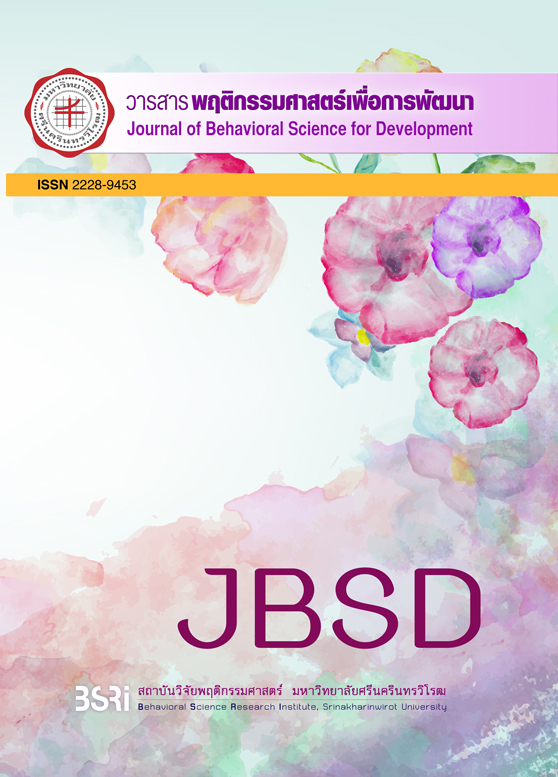The Development of Integrated Instructional Model Based on Buddhist Principles Reflects Sufficiency Economy Philosophy in Context of Modern Thai Society การพัฒนารูปแบบการจัดการเรียนการสอนแบบบูรณาการตามแนวพุทธ เพื่อสะท้อนแนวคิดปรัชญาเศรษฐกิจพอเพียง ในบริบทแห่งสังคมไทยยุคปัจ
Keywords:
integrated instructional model, buddhist principles, sufficiency economy philosophyAbstract
The objectives of this research were 1) to develop of Integrated Instructional Model Based on Buddhist Principles Reflects Sufficiency Economy Philosophy in Context of Modern Thai Society; 2) to learn about the efficiency of Integrated Instructional Model Based on Buddhist Principles Reflects Sufficiency Economy Philosophy in Context of Modern Thai Society for grade 6 students. The sample used was 42 grade 6 students from Anubal Nakhon Nayok School of 2011 academic year. The instruments used included: 1) instructional model evaluation questionnaire, 2) lesson plans based on Buddhist principles, 3) student physical behavior observation form, 4) student social behavior observation form, 5) student emotional behavior observation form, 6) achievement test, 7) student journal, 8) teacher journal, and 9)student opinion record form. Numerical data were analyzed for means, percentage, t-test dependent sampling. And the qualitative data were analyzed using content analysis. The research findings were as follows: 1. The experts’ opinion towards the teaching model was highly positive (X=4.71) 2. The Development of Integrated Instructional Model Based on Buddhist Principles Reflects Sufficiency Economy Philosophy in Context of Modern Thai Society composed of 7 steps: 1) Confident Building & present problem 2) Observation 3) Perception 4) Exploration 5) Investigation 6) Wisdom development & Conclusion and 7) Evaluation & Implementation. 3. The three aspects of students behaviors, physical, social skill, and emotional behaviors have significantly improved from 33.33% before the implementation on the teaching model to 66.66% to 100% after the implementation. Students post test achievement scores were also significantly higher than their pre test scores at .01 level. It can be concluded that the Integrated Instructional Model Based on Buddhist Principles Reflects Sufficiency Economy Philosophy in Context of Modern Thai Society principles can be used effectively.
Keywords: integrated instructional model, buddhist principles, sufficiency economy philosophy
บทคัดย่อ
การวิจัยครั้งนี้มีจุดมุ่งหมาย เพื่อพัฒนาและหาประสิทธิภาพของรูปแบบการจัดการเรียนการสอน แบบบูรณาการตามแนวพุทธเพื่อสะท้อนแนวคิดปรัชญาเศรษฐกิจพอเพียงในบริบทแห่งสังคมไทยยุคปัจจุบัน และเพื่อศึกษาผลการเรียนรู้ ในด้านความประพฤติของนักเรียน [กายภาวนา (Physical Development) และศีลภาวนาของนักเรียน (Social Development)] จิตใจของนักเรียน [จิตตภาวนา (Emotional Development)] และปัญญาของนักเรียน [ปัญญาภาวนา (Wisdom Development)] กลุ่มตัวอย่างเป็นนักเรียนชั้นประถมศึกษาปีที่ 6 โรงเรียนอนุบาลนครนายก ปีการศึกษา 2554 จำนวน 42 คน การเลือกกลุ่มตัวอย่าง เป็นการสุ่มแบบเจาะจง (Purposive Sampling Technique) เครื่องมือที่ใช้ในการวิจัย ประกอบด้วย แบบประเมินรูปแบบการจัดการเรียนการสอนแบบบูรณาการตามแนวพุทธ เพื่อสะท้อนแนวคิดปรัชญาเศรษฐกิจพอเพียงในบริบทแห่งสังคมไทยยุคปัจจุบัน แผนการจัดการเรียนการสอนแบบบูรณาการตามแนวพุทธเพื่อสะท้อนแนวคิดปรัชญาเศรษฐกิจพอเพียงในบริบทแห่งสังคมไทยยุคปัจจุบัน แบบสังเกตพฤติกรรมการเรียนด้านกาย (กายภาวนา) แบบสังเกตพฤติกรรมด้านทักษะทางสังคม (ศีลภาวนา) แบบสังเกตพฤติกรรมการเรียนด้านจิตใจ (จิตตภาวนา) แบบทดสอบวัดผลสัมฤทธิ์ทางการเรียน (ปัญญาภาวนา) แบบบันทึกการเรียนรู้ของนักเรียน แบบบันทึกการสอนของผู้สอน และแบบสอบถามความคิดเห็นของนักเรียนเกี่ยวกับการจัดการเรียนการสอน วิเคราะห์ข้อมูลเชิงปริมาณโดยใช้คะแนนเฉลี่ย ค่าร้อยละ เปรียบเทียบการพัฒนาจากค่าร้อยละ การเปลี่ยนแปลง และทดสอบค่าที และวิเคราะห์ข้อมูลเชิงคุณภาพด้วยวิธีการวิเคราะห์เนื้อหา สรุปผลการวิจัย พบว่า 1) รูปแบบการจัดการเรียนการสอนแบบบูรณาการตามแนวพุทธเพื่อสะท้อนแนวคิดปรัชญาเศรษฐกิจพอเพียงในบริบทแห่งสังคมไทยยุคปัจจุบัน ผู้เชี่ยวชาญมีความคิดเห็นว่าอยู่ในเกณฑ์เหมาะสมมากที่สุด ( = 4.71) 2) รูปแบบการจัดการเรียนการสอนแบบบูรณาการตามแนวพุทธ เพื่อสะท้อนแนวคิดปรัชญาเศรษฐกิจพอเพียงฯ ประกอบด้วยกระบวนการจัดการเรียนการสอน 7 ขั้นตอน คือ ขั้นสร้างศรัทธาและเสนอปัญหาข้อสงสัย ขั้นสังเกต ขั้นสัมผัส ขั้นสำรวจ ขั้นสืบค้น ขั้นสั่งสมปัญญาและลงข้อสรุป และ ขั้นประเมินผลและประยุกต์ใช้ 3) ผลการพัฒนาพฤติกรรมการเรียนด้านกาย (กายภาวนา) พฤติกรรมการเรียนด้านทักษะทางสังคม (ศีลภาวนา) และพฤติกรรมการเรียนด้านจิตใจ (จิตตภาวนา) ของนักเรียน จากการประเมินครั้งแรก นักเรียนมีคะแนนเฉลี่ยร้อยละ 33.33 และการประเมินครั้งสุดท้าย นักเรียนมีคะแนนเฉลี่ย ร้อยละ 100 และเพิ่มขึ้นร้อยละ 66.67 ของการประเมินครั้งแรก ส่วนผลสัมฤทธิ์ทางการเรียน (ปัญญาภาวนา)นักเรียนมีคะแนนเฉลี่ยหลังการทดลองสูงกว่าก่อนการทดลองอย่างมีนัยสำคัญทางสถิติที่ระดับ.01 แสดงว่า รูปแบบการจัดการเรียนการสอนแบบบูรณาการตามแนวพุทธ เพื่อสะท้อนแนวคิดปรัชญาเศรษฐกิจพอเพียงในบริบทแห่งสังคมไทยยุคปัจจุบัน ที่พัฒนาขึ้นสามารถพัฒนานักเรียนได้อย่างมีประสิทธิภาพ
คำสำคัญ: รูปแบบการจัดการเรียนการสอนแบบบูรณาการ แนวพุทธ ปรัชญาเศรษฐกิจพอเพียง



